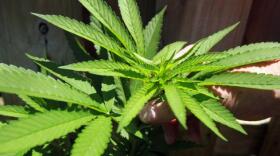It’s April 20, or 4-20, some five years after cannabis sales were legalized in Nevada.
There are now dozens of dispensaries across the state. Over seven months, through January 2021, sales reached $549 million. From that, the state received $87 million in taxes, or a little more than $12 million a month.
That is huge growth from an industry that was totally illegal just a few years ago.
John Hudak is the deputy director of the Brooking Institute’s Center for Effective Public Management. He’s also the author of "Marijuana: A Short History."
Hudak said marijuana's illegal status has its roots in racism. He said originally Mexican immigrants, particularly in the Southwest, would use cannabis.
"There was a movement in California, in Arizona, in Nevada and elsewhere to really turn public opinion against Mexican immigrants, and cannabis became a crutch to do it," he said.
He said it was something that few people knew about at the turn of the 20th Century, which made it something that could easily be made out to be dangerous and scary.
Hudak said people started calling it 'marijuana,' which sounds exotic and foreign. From there, it became part of an anti-immigrant movement and part of the othering of groups of people.
"It was Black Americans starting in the 1920s and 1930," he said, "In the 1950s, it was Beatniks who were associated with cannabis and Hippies '60s."
He said instead of being approached from a sensible public policy perspective cannabis was dealt with from a purely political perspective.
The effort to legalize cannabis has been going on for years, Hudak said. It has been a grassroots effort that made for strange bedfellows. Libertarians saw it as government overreach and progressive saw it as a criminal justice issue.
Now, 18 states have legalized recreational adult use of cannabis.
"In a time when we have hyper-polarization in our politics, cannabis is something that a vast majority of Americans agree on and Democrats and Republicans join hands and vote on ballot initiatives together like the one in Nevada in 2016," he said.
Hudak said Nevada has done a good job with the rules around the industry since that 2016 vote to legalize it. He said the state moved quickly to get the industry up and running but didn't stop there.
"What has been most impressive is once Nevada legalized it did not just pack up and go home, essentially," he said, "Nevada through its subsequent legislative sessions, including the current one, has worked to make changes to the system to improve it, to reflect the demands of the public for that system should look like."
He said even with a part-time Legislature, Nevada has done a pretty job of keeping up with the industry and adjusting the system.
When cannabis was first legalized there were many unknowns, like would there be an increase of crime at dispensaries? Or just how much tax revenue would it create? Or would it lead to more teenagers using it?
Hudak said now that more states have come online we have answers to those questions.
First, he said dispensaries have not been places that have attracted crime. In fact, most are in booming and bright areas where there is very little crime.
As for tax revenue, it has been important, but cannabis is not the magic serum that some people think it is for state budgets. With that said, tax money from legal marijuana sales is better in state budgets than in the illegal market where it has been for decades.
And as for teenage use, Hudak said that in states like Colorado and Washington, which have had legal adult-use for several years, there is no evidence that use by teenagers has gone up, but he believes it something that states should keep watching.
"I think the jury is still out in general about whether there is an effect," he said, "The data that we have so far suggests that there is not an effect but just because a couple of years into an experiment like this you're not seeing an impact doesn't mean that that impact won't necessarily manifest in the future."
Hudak said one of the best things about legalized cannabis is that customers now know what they are getting when they buy it from a dispensary.
"By being able to regulate the products in the market itself, make sure that Nevadans who continue to use cannabis, or Nevadans who are curious about cannabis can go to a store, and for the first time, know exactly what they are getting when they want to purchase cannabis," he said.
And as for the day 4-20, Hudak said there is a lot of myths around where that number came from, but the story he thinks is the best is that it came from students at a California high school, who would gather outside of school to smoke cannabis and get high at 4:20 in the afternoon.
The number and legend grew from there.
John Hudak, deputy director, Brooking Institute’s Center For Effective Public Management










